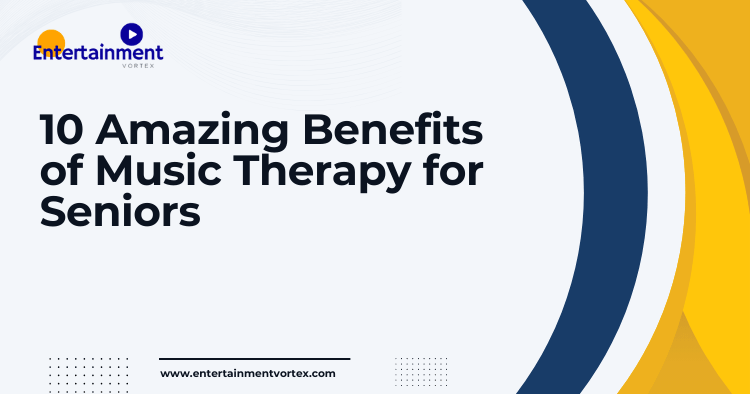Introduction
Music has a profound ability to connect with people on an emotional level, and for older adults, it can be especially beneficial. Music therapy, a clinical and evidence-based practice that utilizes music interventions within a therapeutic relationship, is gaining recognition as a powerful tool for enhancing the quality of life in seniors. In this article, we’ll explore ten amazing benefits of music therapy for older adults, highlighting how it can positively impact their physical, emotional, and cognitive well-being.
“Music therapy is not just about music; it’s about connection, healing, and finding joy in every note.”
Enhances Cognitive Function
Research indicates that music therapy can enhance cognitive function in older adults, particularly those experiencing cognitive decline. Engaging with music—whether through listening, singing, or playing instruments—stimulates various brain regions, improving attention, memory, and executive function. A study published in the Journal of Music Therapy found that music therapy significantly improved cognitive performance in seniors with dementia.
FAQs
Q: How does music affect the brain?
A: Music activates multiple areas of the brain, including those responsible for emotion, memory, and even motor skills, contributing to improved cognitive functions.
“Engaging with music can serve as a cognitive workout for seniors, keeping their minds sharp and alert.”
Reduces Symptoms of Depression
Depression is prevalent among older adults, often exacerbated by feelings of isolation and loneliness. Music therapy provides a creative outlet for expression, helping seniors articulate their feelings more openly. A meta-analysis published in The Gerontologist found that music therapy significantly reduced depressive symptoms in older adults.
FAQs
Q: Can music therapy replace medication for depression?
A: While music therapy can be a powerful complement to traditional treatments, it should not replace prescribed medication without consulting a healthcare provider.
“Music therapy can light the way out of darkness, offering a melody of hope and healing.”
Improves Memory Recall
For seniors, especially those facing memory-related conditions like Alzheimer’s disease, music can serve as a powerful cue for memory recall. Familiar songs can evoke memories and emotions, helping individuals connect with their past. A study in Neuropsychology showed that music therapy improved memory recall in seniors with dementia.
FAQs
Q: What types of music are best for memory recall?
A: Familiar music from a person’s past, especially from their youth, tends to be the most effective for evoking memories.
“Music can unlock the doors of memory, allowing cherished moments to resurface.”
Promotes Social Interaction
Music therapy sessions often involve group activities that encourage social interaction among participants. This social engagement can reduce feelings of loneliness and foster a sense of community. Studies show that group music-making can lead to increased social cohesion, which is crucial for emotional well-being in seniors. Engaging in musical activities can also be a great way for families to bond. For more ideas on family activities, check out 10 Fun Hobbies to Enjoy Together with Your Kids.
FAQs
Q: How can caregivers incorporate music therapy at home?
A: Caregivers can create music playlists, encourage sing-alongs, or even attend local music therapy classes together to foster social interaction.
“Through music, we can bridge the gaps between generations and create lasting memories.”
Aids in Pain Management
Music therapy has shown promise in pain management for older adults. Listening to soothing music can distract from pain and reduce anxiety, making it a valuable tool for those dealing with chronic pain or post-operative recovery. Research published in Pain Management Nursing indicates that music therapy can significantly lower pain levels in elderly patients.
FAQs
Q: What kind of music is best for pain relief?
A: Soft, calming music, often referred to as “ambient” music, is generally most effective for pain relief.
“Music can serve as a gentle balm for the soul, easing both physical and emotional discomfort.”
Enhances Physical Rehabilitation
Music therapy can also play a significant role in physical rehabilitation efforts for seniors. Rhythm and tempo in music can enhance motor skills and coordination, making exercises more enjoyable and effective. A study in The Journal of NeuroEngineering and Rehabilitation found that rhythmic auditory stimulation improved gait and movement in seniors recovering from strokes. For more ideas on engaging activities, check out Top 10 Stress Relief Hobbies to Boost Well-Being.
FAQs
Q: Can music therapy be used in physical therapy sessions?
A: Yes, many physical therapists incorporate music therapy techniques into their sessions to motivate and engage patients.
“Incorporating music into rehabilitation can turn hard work into a joyful experience.”
Encourages Emotional Expression
Music serves as a powerful medium for emotional expression, allowing seniors to convey feelings that may be difficult to articulate verbally. In music therapy, individuals can express their emotions through songwriting or improvisation, promoting emotional healing. This practice can be particularly beneficial for those who have experienced trauma or loss.
FAQs
Q: How can I encourage my loved one to express themselves through music?
A: Encourage them to share their favorite songs, discuss their feelings about music, or even create simple musical compositions together.
“Through music, feelings can find their voice and healing can begin.”
Supports Spiritual Well-being
Music therapy can also nurture the spiritual well-being of older adults. Engaging with music that resonates with their spiritual beliefs can offer comfort and a sense of connection to something greater than themselves. Many music therapists incorporate elements of spirituality into their sessions to enhance this experience.
FAQs
Q: Can music therapy be combined with religious practices?
A: Absolutely! Many music therapists work collaboratively with spiritual leaders to incorporate music into religious services or spiritual gatherings.
“Music has the power to transcend the ordinary, connecting us to the divine.”
Fosters a Sense of Purpose
Finally, music therapy can help seniors find a renewed sense of purpose in life. Participating in music-making activities, whether it’s performing, composing, or simply enjoying music, can empower older adults and boost their self-esteem. A sense of accomplishment in these activities can significantly enhance their overall quality of life. For more inspiration on creative projects, check out 10 Easy DIY Projects for Beginners to Spark Creativity.
FAQs
Q: How can I help my loved one find purpose through music?
A: Encourage them to join local music groups, take lessons, or volunteer to share their musical talents with others.
“Finding purpose in music can illuminate life’s journey and bring joy to the heart.”
Conclusion
Music therapy offers a treasure trove of benefits for older adults, enhancing their cognitive function, emotional well-being, and social connections. As we continue to understand the profound impact music has on our lives, it’s essential to consider how we can incorporate music therapy into the care of our beloved seniors. Whether through formal therapy sessions or simple musical interactions at home, introducing music into their daily routine can lead to a richer, more fulfilling life.
“Let the power of music be the soundtrack to a more vibrant and meaningful life.”
For more information on music therapy, you can explore resources from the American Music Therapy Association and the National Institute on Aging.
References
- Journal of Music Therapy
- The Gerontologist
- Neuropsychology
- Music & Medicine
- Pain Management Nursing
- The Journal of NeuroEngineering and Rehabilitation
With these insights, you can help ensure that the seniors in your life reap the incredible benefits of music therapy. So turn up the volume, and let the healing begin!






